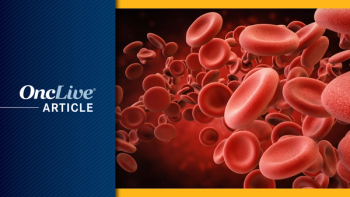
FDA Approves Frontline Venetoclax in AML
The FDA has granted an accelerated approval to venetoclax for use in combination with azacitidine or decitabine or low-dose cytarabine for the treatment of adult patients with newly-diagnosed acute myeloid leukemia (AML) who are aged 75 years or older, or who have comorbidities that preclude use of intensive induction chemotherapy.
The FDA has granted an accelerated approval to venetoclax (Venclexta) for use in combination with azacitidine or decitabine or low-dose cytarabine for the treatment of adult patients with newly-diagnosed acute myeloid leukemia (AML) who are aged 75 years or older, or who have comorbidities that preclude use of intensive induction chemotherapy.
The approval is based on 2 phase Ib/II trials in this setting, the M14-358 study and the M14-387 study. In M14-358, combining venetoclax with azacitidine led to a complete remission (CR) rate of 37% and a CR with partial hematological recovery (CRh) rate of 24%. The rates were 54% and 7.7%, respectively, with the combination of venetoclax and decitabine.
M14-387 examined venetoclax in combination with low-dose cytarabine (LDAC). The CR and CRh rates with the combination were both 21%.
“Today’s approval marks a significant advance for people with acute myeloid leukemia, a highly aggressive and difficult-to-treat blood cancer,” Sandra Horning, MD, chief medical officer at Genentech, a unit of Roche, which co-develops venetoclax with AbbVie, said in a statement.
"Many people with acute myeloid leukemia are unable to tolerate standard intensive chemotherapy, and the Venclexta combination regimens represent important new options for these patients,” added Horning.
The M14-358 study included a subpopulation of 80 patients with newly diagnosed AML who were aged ≥75 years or ineligible for intensive induction chemotherapy. These patients received venetoclax (daily ramp-up to a final 400 mg once daily dose) in combination with a hypomethylating agent, either azacitidine (n = 67) or decitabine (n = 13).
The median age across both arms was approximately 75 years and at least 97% of patients in each arm had an ECOG performance status of 0 or 1. In the azacitidine group, 64% of patients had intermediate cytogenetic risk and 34% had poor cytogenetic risk. The rates were 38% and 62%, respectively in the decitabine group.
The median time to first CR or CRh was 1.0 month (range, 0.7-8.9) in the azacitidine group and 1.9 months (range, 0.8 -4.2), for the decitabine group. Five of the 67 patients treated with venetoclax/azacitidine went on to receive stem cell transplant.
According to a press release from Genentech, the most common adverse events (AEs) with venetoclax plus azacitidine were nausea, diarrhea, constipation, low white blood cell count with or without fever, low platelet count, bleeding, swelling in the arms, legs, hands and feet, vomiting, fatigue, rash and low red blood cell count.
The company reported that the most frequent AEs with venetoclax plus decitabine were low white blood cell count with or without fever, constipation, fatigue, low platelet count, abdominal pain, dizziness, bleeding, nausea, pneumonia, infection in the blood, cough, diarrhea, low blood pressure, pain in muscles or back, sore throat, swelling in the arms, legs, hands and feet, fever and rash.
The M14-387 study included a subpopulation of 61 patients with newly diagnosed AML who were aged ≥75 years or had comorbidities that made them ineligible for intensive induction chemotherapy. Patients received venetoclax (daily ramp-up to a final 600 mg once daily dose) plus LDAC.
The median age was 76 years (range, 63-90), 99% of patients had an ECOG performance status of 0-1 or 2. Fifty-nine percent of patients had intermediate cytogenetic risk and 34% had poor cytogenetic risk.
The median follow-up was 6.5 months (range, 0.3-34). The median time to first CR or CRh was 1 month (range, 0.8-9.4).
Genentech noted in its press release that the most common AEs with venetoclax plus LDAC were nausea, low platelet count, bleeding, low white blood cell count with or without fever, diarrhea, fatigue, constipation, and difficulty breathing.
The accelerated approval of venetoclax in AML is contingent on the results of a confirmatory trial.
FDA Prescribing Information for Venetoclax. Accessed November 21, 2018. https://www.rxabbvie.com/pdf/venclexta.pdf.



































